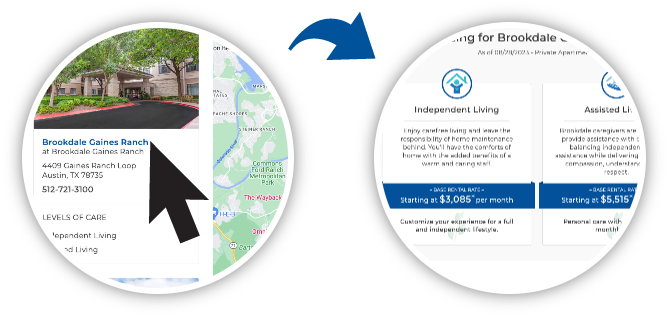- Home
- Brookdale Life
- Brookdale Blogs
- Dementia and Sleep: 8 Tips to Keep Nighttime from Becoming a Nightmare
Alzheimer's & Dementia, Health, Safety and Wellness, Brookdale Solutions
July 24, 2017
Dementia and Sleep: 8 Tips to Keep Nighttime from Becoming a Nightmare
Night can become an anxious time as dementia progresses. The disease may interfere with the sleep/wake cycle in the brain, leading to overnight restlessness and daytime drowsiness, which can make symptoms worse. It may also rob care partners of the rest they need, leading to chronic and even dangerous exhaustion.
For all adults, aging tends to change sleep patterns. Typically, people begin waking up throughout the night, sleeping fewer hours and achieving a lower percentage of deep sleep. All of these issues also affect those with dementia as they age, but they can be more pronounced. The synchronized circadian sleep rhythm becomes disrupted, breaking sleep up into several segments over a 24-hour period. This can cause excessive sleepiness during the day and insomnia at night.
In addition, a few forms of dementia are associated with certain sleep disorders. People living with Alzheimer’s are more likely to wander at night, while those with vascular dementia may experience altered breathing while sleeping. Parkinson’s can cause daytime drowsiness, or sudden onsets of sleep, and dementia with Lewy Bodies can produce hallucinations and the more frequent awakenings at night due to vivid dreams.
While sleep medication might seem like an answer to the problem, research has not proven that it helps. In fact, a number of studies show that it can lead to more sleep disturbances rather than less. Plus, these medications can negatively affect cognition, which increases confusion for people living with dementia. However, there are a number of helpful steps care partners can take that don’t involve drugs. They include:
1. Checking with a physician to make sure a physical condition such as undiagnosed pain or a urinary tract infection isn’t the culprit.
2. Ensuring exposure to natural light during the day.
3. Making sure the person with dementia exercises for least 30 minutes a day, although not within four hours of bedtime.
4. Providing purposeful things to do throughout the day. Being engaged in meaningful ways discourages daytime sleeping and contributes to feeling pleasurably tired in the evening.
5. Not serving alcohol, caffeine and large meals as bedtime approaches.
6. Scheduling a bathroom visit right before going to bed.
7. Using time-honored methods for relaxing, such as a short massage, a warm bath or snuggling with a pet.
8. Limiting screen time before bed or using an amber-colored nightlight. Studies show white light interferes with a person’s ability to return to REM level sleep. Shutting off electronic devices or switching them to the night shift setting can help. Amber light doesn’t affect a person’s ability to sleep like white light does.
Dementia’s impact on sleep is something to take very seriously. Just as Renee did with her mom, care partners should carefully consider how much it is compromising their own health and ability to cope. Chronic exhaustion can become dangerous, even causing accidents and injury.
If the issue can’t be addressed, it may be time to consider a dementia care community, where teams of specially-trained people can provide the care that’s needed both day and night. This ensures high quality of care for the person with dementia and enables family members to get the rest they need to continue their invaluable role of cherishing their loved one.
Categories
- Alzheimer's & Dementia
- Caregiver's Corner
- COVID-19
- Health, Safety and Wellness
- Financial Well-Being
- Passion & Purpose
- The Journey to Senior Living
- Trending Now
- Socialization & Relationships
- Brookdale Solutions
- Brookdale Vision and Growth
Archives
View All
- October 2025
- September 2025
- August 2025
- July 2025
- June 2025
- May 2025
- April 2025
- March 2025
- February 2025
- January 2025
- December 2024
- November 2024
X
Let us help find the right community for you!
Complete the form and a Senior Living Advisor will be in touch!
Inside Brookdale Communities
See what’s happening on our community Instagram pages
Brookdale has communities near you!



